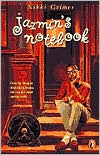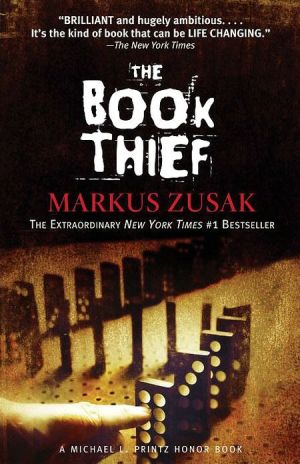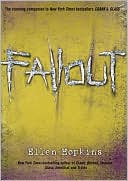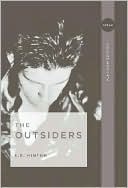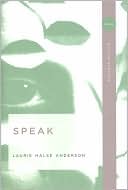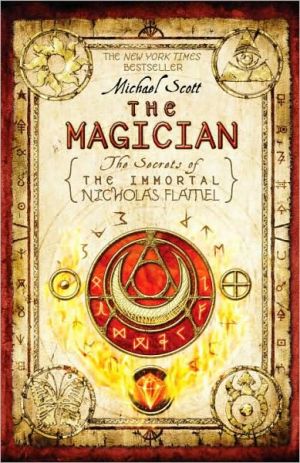Jazmin's Notebook
Jazmin Shelby was "born with clenched fists"-which is okay, since she's got a lot of fighting ahead of her. Her dad died a couple of years back, and now that her mom's in the hospital, it's just her and her big sister, CeCe. But that's fine by Jazmin. She's got her friends, her school, lots of big plans for the future-and a zest for life and laughter that's impossible to resist.\ A Coretta Scott King Honor Book A Booklist Editors' Choice Book A Child Study Children's Book Committee Children's...
Search in google:
Jazmin, an Afro-American teenager who lives with her older sister in a small Harlem apartment in the 1960s, finds strength in writing poetry and keeping a record of the events in her sometimes difficult life.Publishers WeeklyHard times in 1960s Harlem do not squelch the ambitions of Grimes's (Growin'; Raining Laughter) doughty protagonist, nor inhibit Jazmin from penning her eloquent ideas. Readers will be drawn into Jazmin's neighborhood, where they meet the characters who have made an impact on the teen with "coke-bottle spectacles" and "chicken-legs": Jazmin's mother, institutionalized for alcoholism; her protective sister, CeCe; her best friend, Destinee; and Crew, a professional gambler who is sweet on Cece (he secretly sees to it that the pair can pay their bills). In this slender volume, Grimes depicts both the humor and tenacity of an adolescent who spent most of her childhood in foster homes and is determined to make something of herself. Jazmin's poems, sprinkled among her journal entries, crystallize her emotions from joy and reverence ("The library/ is no place to kneel/ but this cathedral of books/ feels holy") to sorrow (e.g., "The homes/ are just fine./ It's the people/ who are broken"). Her prose expresses a more detailed account of her fears (contending with rats, potential rapists and school bullies) and hopes (laughing with CeCe, celebrating holidays and observing signs of her mother's recovery). An articulate, admirable heroine, Jazmin leaps over life's hurdles with agility and integrity. Ages 12-up. (June)
copyright ?1998 by Nikki Grimes published by Dial Books for Young Readers A Member of Penguin Putnam Inc. - excerpt (pages 14-25) FOR SALE I pass the used-goods store peek at the bronzed baby shoes useless and dusty in the window.\ It's legal to sell such things,\ I know.\ But it feels wrong to me,\ someone selling someone else's memory.\ MAY 28 It must drive God crazy to see how much we take for granted. My friend Jabari is a great example. This afternoon his grandmother left Wilson's Drugstore, grinning, and hurried across the Avenue clutching a large envelope. She stopped in front of The Garden to catch her breath, and waved me over while she rested. ?Looka here,? she said, slipping an 8 x 10 glossy from the envelope. It was a photo from Jabari's prom.\ ?That's my grandbaby!? she said, proud as the First Lady, going on about how clever she knew he was, and how he got his brains from her side of the family, and how she planned on framing his diploma-in silver, no less. Man! You-d think he had graduated from Harvard, instead of being on his way to high school along with the rest of us. Then again he might be the first in his family to make it so far. Whether he is or not, I suppose his grandmother has the right to brag.\ I smiled politely and said, yes, Jabari did look mighty handsome in that fine suit. Which is right about when she dug out her wallet and rewarded my good manners by showing me an old photograph of Jabari, scooting, bare-bottomed, across a baby blanket.\ "He always was the cutest thing," she cooed.\ All I could think was, Poor Jabari! What's this thing grown-ups have about showing off embarrassing pictures of naked babies? I don't know. I couldn-t keep from laughing, though. After all, this is the guy I sometimes meet on the basketball court after school, for a game of one-on-one. Now, thanks to seeing that photo, I'll never be able to look at his sweaty, muscled, six-foot frame quite the same again. And it didn't help that Jabari showed up while tears of laughter were still streaming down my cheeks.\ Can't much blame him for snatching that wallet right out of his grandma's hands. I'd have done the same. But, trust me: Jabari ought to be counting his blessings. There are no photos of me as a baby, carefully pasted in a family album. No sweet portrait on a mantel beside a pair of bronzed baby shoes. There are no Kodak memories of my third birthday party, face happily smeared with cake frosting, or strawberry ice cream. There are no wallet-size proofs of my existence at the age of eight. Or nine. Or ten. I wish there were.\ Some foster homes are pretty okay, but you can't have pictures if you barely live with folks long enough to learn their address. Theyfive got no reason to take them. Of course, it's different now that I'm with CeCe. She takes lots of pictures, pictures of me, of me with my friends Destinee and Sophie, pictures of CeCe and me together. In fact, she's gone a little picture crazy, if you ask me. Still, it's hard to keep track of a little thing like a photograph when you're constantly moving. Stuff gets left behind. No one can help that. Not even CeCe.\ So I'm not taking any chances. These words, these notes are gonna be my photographs of me. Of who I am, and what I do, and what my life is like. Here. Now.\ Someday I'll look at this photograph of me, and Jabari, and his oh-so-proud grandmother, and I'll grin. The way I'm grinning now.\ MAY 29 Ifive got mixed feelings about UFOs and aliens, but Ifive had a number of close encounters in my life, and I know I'm not the first. There's this lady I call Sister Church, because I see her on the way from one each Sunday and Ifive noticed the secret sparkle she has in her eye, as if she's seen or heard something that no one else has. She high-stepped down the Avenue earlier today, uniformed in white to match the other women of New Jerusalem Sanctuary of the Redeemed, over on St. Nicholas. White straw hat, white cotton gloves clutched in her hand, blazing white short-sleeve dress, white bag, and white shoes. You know, those flat, orthopedic-looking numbers. Nurse's shoes maybe. Either way, they gleamed like snow.\ I'm not exactly sure what white has to do with God. I understand the connection with purity, of course. Ivory soap, 99 and 44/100 % pure, etcetera. Fine. I get it. Still, when I look at the world God made, I get the distinct impression that He's partial to color. Sister Church does look good in white, though. Cool, too, on this warm May day.\ Shawna was on the stoop with me when Sister Church danced by, high on the spirit, bubbling over with what CeCe calls 'the zeal of the Lord.'\ 'Good afternoon,' she greeted, mopping her brow with a lace kerchief. White, of course. 'How y'all young folks doin' today??\ 'Fine,' I said, answering for both of us. Shawna was too busy snickering to be polite.\ 'I believe the Good Lord gave me a message for you this mornin'. He spoke to me. Yes, He did. He said, 'I have given angels charge over thee.' ? Her words sent a tingle up my spine, but Shawna just rolled her eyes. ?Lady, you must be hearin? voices again, ?cause ain't no God tell you nothin?. If there is a God,? she added, rubbing her swollen belly. The small life inside gave her a walloping kick.\ Good, I thought. Serves you right. Then I remembered what CeCe says: Be patient with people. We all believe what we know, or what we can, or what we want to.\ Believing in close encounters of the spiritual kind comes easily to me, partly because CeCe was born with second sight, and Ifive been hearing about visions and prophetic dreams all my life, and partly because Ifive met and talked to angels on more than one occasion, and found their presence so matter-of-fact that I assumed other people saw them too. Ifive learned not to talk about such things. I don't enjoy being laughed at.\ Still, there's a lot that happens in this life that people can't explain. Like why CeCe could be in Jersey, and I could be in Ossining, New York, and every time she gets a stomachache, I do too. Or what happened the time CeCe and I were in that foster home on Long Island and ran away because the woman beat us.\ I was three years old then, but I remember how we skipped down the street so no one would notice we were leaving. And how, once we turned the corner, our feet flew. The next thing I knew, we were inside of Mom's apartment in Manhattan, standing at the window, waving to her as she came home. Shocked to find us there, she raced upstairs, shoved her key in the door, and discovered that it was still locked. From the outside.\ The trip itself was part of the mystery. There were no bus rides, no train rides that I remember. There was no passage of time. And once we reached Mom's place, there was no standing outside the door, struggling for entrance. None of Mom's neighbors saw us come in. No one gave us a key. And no one has an explanation for these things, except CeCe and me, and ours isn't one Mom wants to hear.\ Let's just say angels were involved. Did we see them? No. But then, angels aren't in the habit of showing themselves. Besides, even if we had, even if we could describe them from head to toe, no one was prepared to believe us. Least of all Mom. This kind of stuff gives her the chills, which is sad because the truth is better than any tale we could whip up. In the end she took comfort in dismissing our account, calling it the product of a child's wild imagination, and deciding, unilaterally of course, that we were not to speak of fithe incident? again.\ Ifive kept it stored away in memory, along with all the other unexplained phenomena Ifive felt, or seen, or heard. Ifive got this idea, see, that God is saving me for something, that He's grooming me for a particular purpose in life, and all these spirit-world encounters are part of it somehow. If only I knew how the puzzle-pieces fit.\ Shawna thinks I'm crazy for nursing this notion. Big surprise there! According to her, with the world being so big, and so desperately in need of help, what makes me think God has time to worry about saving me? For anything? Answers come hard, and Shawna's simply looking for an argument. I decide to give her neither. Besides, it's Sunday and I don't want to lie, not even to myself.\ I don't know what God's got planned for me. Or why Dad had to die. Or why Mom can't quit drinking, or stay healthy, or figure out how to love me. I don't understand why CeCe and me got stuck with a life full of way too much drama. But I know if Ifive got questions, there must be answers.\ One of these days I'm going to run into God, in a dream maybe, or in a vision, and I'm going to lay out all my questions, one at a time, and get the answers I need. And while I'm at it, I think I'll ask Him if there's really any connection between angels and UFOs.\ JUNE 3 CeCe came to school today. Mr. Sanders, our principal, called her in to talk about dress codes. He didn't like the African dress I wore this week, but his jaw really dropped when CeCe strode into his office, wrapped in yards of African fabric. Mr. Sanders forgot I was even there, he was so busy staring at her. He said something about how certain clothes can be a distraction in class, and then his voice trailed off.\ CeCe eyed him for a minute, then said, ?The next time you call me in, it had better be because Jazmin has broken the law, or is flunking a class. Otherwise, don't waste my time.?\ I bit my tongue to keep from laughing. I'd never watched anyone turn beet-red. Too bad I didn't have a camera.\ CENTRAL PARK LESSON Once, in Central Park I slogged through early morning mist and grabbed a fistful felt it lick my fingers then slip away,\ rising, weightless and invisible to the sky and all I had left to prove its wet,\ sun-silvered reality was the image in my mind.\ JUNE 10 It seems to me that ideas are like gossamer, or mist, fragile as a dream forgotten as soon as you awake. I guess that's why they're so hard to hold on to. But that's also what makes them wonderful, and more than worth all the trouble.\ I was in Central Park last Saturday when the idea for a poem sprinkled down on me, like a sudden shower, and I knew it wouldn't last long.\ I grabbed a pencil from behind my ear. I'd stuck it there that morning when I'd done homework, and boy was I glad. Panic set in, though, when I checked my pockets for paper. Wallet and keys were all I had on me because I'd gotten the notion from a kid at school that traveling light was cool.\ No problem, I told myself, and went up to the first stranger I could find to beg for a notebook page, or a napkin, or even a piece of tissue. But as soon as the lady saw me approach, she waved me away. Another woman told me, flatly, that she didn't believe in handouts. Several others eyed me suspiciously. Judging by the fear in their white faces, the fact that I was, at that moment, a frantic, wild-eyed, Black teenager probably had something to do with it. But who had time to dispel racial stereotypes? The poetry raining down on me was slowing to a trickle. If I didn't find writing paper soon, the poem would be lost.\ I mustfive been quite a sight, though, staggering through the park in drab T-shirt and holey bell-bottoms, mumbling drunkenly, 'Gotta find paper! Gotta find paper!' I was almost ready to give up when I spotted a garbage can, one of those open-grated kind the New York Parks Department seems to favor. I held my nose with one hand, and reached in with the other. It was pretty disgusting, I admit, but you do what you have to.\ I carefully picked my way through crushed cans of Coke, balled up Kleenex, beer bottles, and old newspapers. Nothing I could use there. Then I got excited about two matchbook covers that were pretty clean, but they were too small for the job I had in mind.\ Finally I found a crumpled, but otherwise unsullied, Hershey's candy bar wrapper, and whispered, Thank God! I ignored the passersby who wagged their heads as if to say 'poor thing,' squatted on the nearest curb, and scribbled like a maniac.\ Here's the best part. I have no idea what that poem was about, or where that piece of paper is. It could have slipped from my pocket on the subway seat while the AA local lurched its way uptown. Or I could have dropped it in the stairwell when I ran up the three flights to our apartment. Who knows. One way or another, I lost the poem by the time I got home that day, and I can't, for the life of me, recall a single verse. Nothing. Nada. Zilch.\ But I do remember my fingers flying across that scrap of paper, and my heart pounding, and the rush I felt scratching out each word. I remember the excitement of molding that inspiration, and shaping it on the page, like clay. And I remember feeling powerful and powerless, all at once, and how the pleasure of that moment lingered for a long, long time. Even the remembering has joy in it. But the poem itself? Gone. Just . . . gone.\ CeCe says everything happens in life to teach us something, and I believe her.\ I'm not saying I completely understand the point of pouring your heart into a poem and then losing it forever. But from now on I'm carrying a pad and pen with me wherever I go. And I'm going to enjoy every good thing that comes my way, as much as I can, for as long as I can. I plan to treat each thing as if it's gossamer, or mist. Just in case.
\ Publishers Weekly\ - Publisher's Weekly\ Hard times in 1960s Harlem do not squelch the ambitions of Grimes's (Growin'; Raining Laughter) doughty protagonist, nor inhibit Jazmin from penning her eloquent ideas. Readers will be drawn into Jazmin's neighborhood, where they meet the characters who have made an impact on the teen with "coke-bottle spectacles" and "chicken-legs": Jazmin's mother, institutionalized for alcoholism; her protective sister, CeCe; her best friend, Destinee; and Crew, a professional gambler who is sweet on Cece (he secretly sees to it that the pair can pay their bills). In this slender volume, Grimes depicts both the humor and tenacity of an adolescent who spent most of her childhood in foster homes and is determined to make something of herself. Jazmin's poems, sprinkled among her journal entries, crystallize her emotions from joy and reverence ("The library/ is no place to kneel/ but this cathedral of books/ feels holy") to sorrow (e.g., "The homes/ are just fine./ It's the people/ who are broken"). Her prose expresses a more detailed account of her fears (contending with rats, potential rapists and school bullies) and hopes (laughing with CeCe, celebrating holidays and observing signs of her mother's recovery). An articulate, admirable heroine, Jazmin leaps over life's hurdles with agility and integrity. Ages 12-up. (June)\ \ \ \ \ Children's Literature\ - Michelle H. Martin\ Jazmin Shelby, so named because of her late father's love of jazz, lives with her older sister CeCe in a downtown apartment between a laundromat and the Garden of Eden Bar and Grill. Jazmin feels fortunate to live with CeCe, since they both spent most of their formative years in foster homes and in the homes of numerous relatives. Because Jazmin aspires to be a writer, she begins each chapter of this book (which is also each entry of her journal) with an original poem about the trials and joys of being a black female adolescent, growing up in the shadow of a drug-addicted mother. Jazmin's reflections on her father's untimely death help her both to come to terms with loss and to grow past the anger that she has toward her mom for abandoning them. Grimes' depiction of this outspoken and thought-provoking character offers a refreshing look into the mind of a teenager who is worth spending time with.\ \ \ VOYA\ - Laura L. Lent\ Jazmin, a fourteen-year-old girl living in Harlem with her sister, Ce-Ce, has found an outlet for her emotions: she writes about everything she sees, hears, and experiences in her daily life. Recorded in her notebook as prose or poetry, Jazmin sits on the stoop of her apartment in the heart of the ghetto providing readers with an introspective look at the sights, sounds, dangers, and desires that await her. Jazmin holds back nothing. Her writings are so passionate that readers will visualize life as she does. Readers feel her anguish over the loss of their father; her frustration with her mother's dependency upon alcohol; her terror when a man grabs her late one night as she returns from a neighborhood bar after buying cigarettes for her sister; her joy when she is able to write; her reverence for books; her fervent hope for a successful future; and her absolute conviction that her dreams are attainable if she fights for them. Grimes's exciting and fast-paced book challenges readers to look at life in the 1960s as it was (and probably still is) for an adolescent black girl. Jazmin's intelligence is apparent and her thirst for knowledge is real; however, like many others in similar situations, she must overcome her environment and the prejudices that surround her. Adolescents will readily relate to the problems that Jazmin, like all teens, must face. Because of Jazmin's writing and determination to succeed in life despite the challenges that confront her, readers are left with a sense of hope. Jazmin is a survivor, as we all should be. This novel is a must-read book for adolescents and for those of us who may have forgotten what adolescence is all about--coming into our own. VOYA Codes: 5Q 4P M J S (Hard to imagine it being better written, Broad general YA appeal, Middle School-defined as grades 6 to 8, Junior High-defined as grades 7 to 9 and Senior High-defined as grades 10 to 12).\ \ \ \ \ School Library JournalGr 6-10-With exuberance, passion, perception, and wit, 14-year-old Jazmin Shelby fills her notebook with glimpses of her life, neighborhood, family, and dreams in Harlem in the 1960s. Rescued from a series of foster homes and makeshift living arrangements by her older sister, CeCe, Jazmin draws strength and wisdom from her devoted sibling when their alcoholic mother is institutionalized. Jazmin is an observer and a thinker. From her apartment stoop, she savors the rhythm and blues that drifts out of the Garden of Eden Bar & Grill next door and watches customers come and go. At school, she avoids a fight by locking herself in the bathroom and scribbling her anger in verse. When a high-school guidance counselor suggests pursuing a vocational career, Jazmin clings to her aspirations of being a writer and demands a college-prep schedule. Despite her "second hand" appearance, the girl's goals are high and her attitude is positive. The sadness in her life comes from watching her gentle father die after a car crash and being unable to connect with her troubled, aloof mother. However, Jazmin is resilient. Her lyrical journal is a treasure of sensory observations, intellectual questioning, and moral decision-making. Secondary readers will delight in her candor and imagination. Her gritty determination to survive and succeed is inspiring and heartwarming.-Gerry Larson, Durham Magnet Center, Durham, NC\ \ \ \ \ Kirkus ReviewsThere's a poetic soul taking notes up on Amsterdam Avenue in New York City, and her name is Jazmin Shelby, the star witness to the hard lives and high hopes in a novel from Grimes (Come Sunday, 1996, etc.). Jazmin has her sights set on college, but meanwhile she keeps her eyes open, noticing all the comings and goings of her 1960s neighborhood from her front stoop. She records everything in her notebook, including a running commentary on her family, feelings, friendships, hopes, and disappointments. Her father has been dead a year, and her mother—a mentally unstable alcoholic—is hospitalized; Jazmin's life has included shuttling between relatives and foster homes, living in rat-infested tenements, and avoiding the everyday violence of the streets. Older sister CeCe is a source of strength, who, along with some supportive neighbors and teachers, have helped Jazmin hang on to her goals and resist the pitfalls of drugs, alcohol, and sexual activity. Peppering the first-person narration with poems from Jazmin's journal, Grimes paints a vivid picture of her character's surroundings. Especially effective are Jazmin's witty descriptions of neighbors and local characters; just as compelling is Jazmin's interior landscape, in which a wiser, more reflective voice hints at the young woman—and writer—she'll become. (Fiction. 10-12)\ \
